For a summary of Amid and Sanaz’s story, you can read our feature article here.
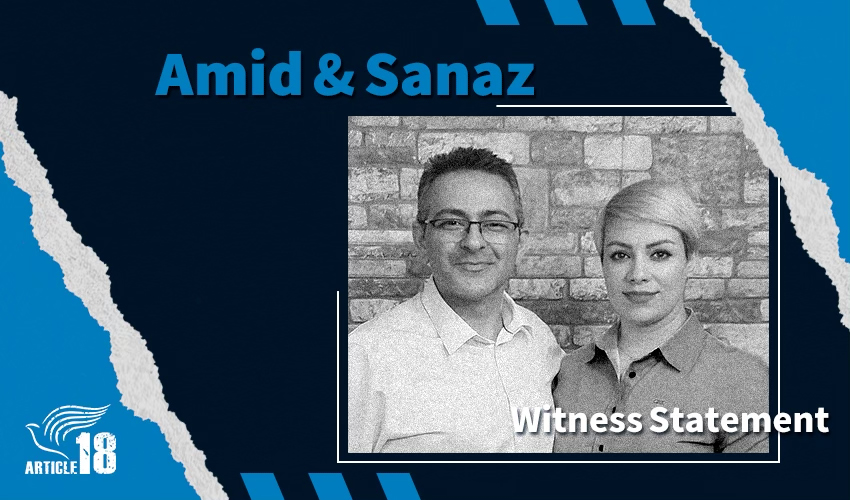
Background
Amid
1. My full name is Aliasghar Fathollahi, but I am known as Amid Fathi. I was born in 1974 in Hamedan [western Iran] into a family that isn’t very religious but adheres to religious principles. I was the only son, and our family was relatively well-off. But at the age of 21, I developed a drink problem, which lasted for around eight years, before I became a Christian, and had a bad effect on me and my life.
2. But in August 2004, some of my friends talked to me about a part of the Bible – the Psalms – and after that conversation I became eager to know more about Christianity, and started investigating it.
3. The tomb of [biblical characters] Mordechai and Esther is in Hamedan, and I went to the bookstore next to the tomb to look for a Bible, and the shop owner had a second-hand copy. Until then, I didn’t even know that the four Gospels were part of the Bible, but every day I began to diligently read the Bible, though I didn’t understand the meaning of many passages and didn’t know any Christians to whom I could ask my questions.
4. Gradually, I began to consider myself a Christian, but people around me mockingly said: “To become a Christian, you’d have to change your blood!” But after a while I met some other Christians, and we used to study the Bible and pray together in Luna Park in Hamedan. They had also recently become Christians and didn’t know much about Christianity. And though I considered myself a Christian during that time, it was two years later, in 2006, when I became a Christian with more knowledge and certainty, and gave my heart completely to Jesus Christ.
5. I also married my wife Sanaz in 2006, and in 2010 she also became a Christian and we had a son named Danial. When we were first married, I worked in my father’s store, which he owned, but after he sold it I worked in the accounting department at the Iran Khodro car dealership owned by my sister’s husband.
Emmanuel Church
6. When our son was around one year old, someone introduced us to the Persian-speaking Emmanuel Church in Vanak Square, Tehran. My wife and I used to leave Hamedan for Karaj [next to Tehran] every Friday at 5am, and leave our son at my sister’s house in Karaj. Then we would go to Emmanuel Church in Tehran. The church had a Sunday school for children, but only for children over three years old, so that’s why we couldn’t take Danial to church.
7. During Holy Week that year, the church held a meeting every day, and so we went to Tehran every day at 5 in the morning and returned home at 11 at night. The pastor of the church was surprised by our enthusiasm, and how we attended the church every day.
House-church in Hamedan
8. Since 2010, the Ministry of Intelligence had asked the church to inform them of the national ID-card numbers of members, so they could take down their names. But they forgot to enter our names in the file, which worked in our favour.
9. But in the spring of 2012, the Ministry of Intelligence banned Persian-speaking Christians from entering Emmanuel Church, so we could no no longer participate in the services, and we were very sad about this.
10. A month after Emmanuel Church closed, we began to hold weekly house-church meetings in our home. We talked to many people about Christ, and gave them Bibles. Everything we had learned in the church, we taught to other Christian converts. And day by day, the number of members of our home-church increased, and soon we had to divide them into three groups.
11. In 2013, we were finally baptised in Erbil in Iraq by a Christian friend we had met online.
Arrest
12. For a while, I had a feeling that we would be arrested soon, and it was for this reason that we didn’t hold a Christmas party in 2015. We had also hidden some items, like our passports, baptism certificates and computer hard drive, which contained information about the names of church members, and audio files of sermons, worship songs, and lessons about the principles of the Christian faith.
13. Then, on 26 December 2015, some of the other leaders of our [house-]church came to our home to discuss various issues and plans. We prayed together, ate the food that my wife had cooked, and then everyone went home, apart from one couple and their child, who stayed at our house. We didn’t go to bed until 3.30 in the morning.
14. Then, between 6.30 and 7am, I woke up to the repeated sound of the doorbell. I was sleepy because of going to bed late and didn’t answer the intercom; I just went to the door and opened it.
15. And on the other side, there was an agent with a camera, and he entered our home, along with two other male officers and two female officers. One of the agents said: “We are agents of the Ministry of Intelligence. Aliasghar Fathi?” “Yes,” I said. He said: “Is Mrs Sanaz Karami home?” I said: “Yes, she’s inside.” He showed me a piece of paper, and said: “This is the search warrant for your home.” He showed it very quickly, so I couldn’t see what it said.
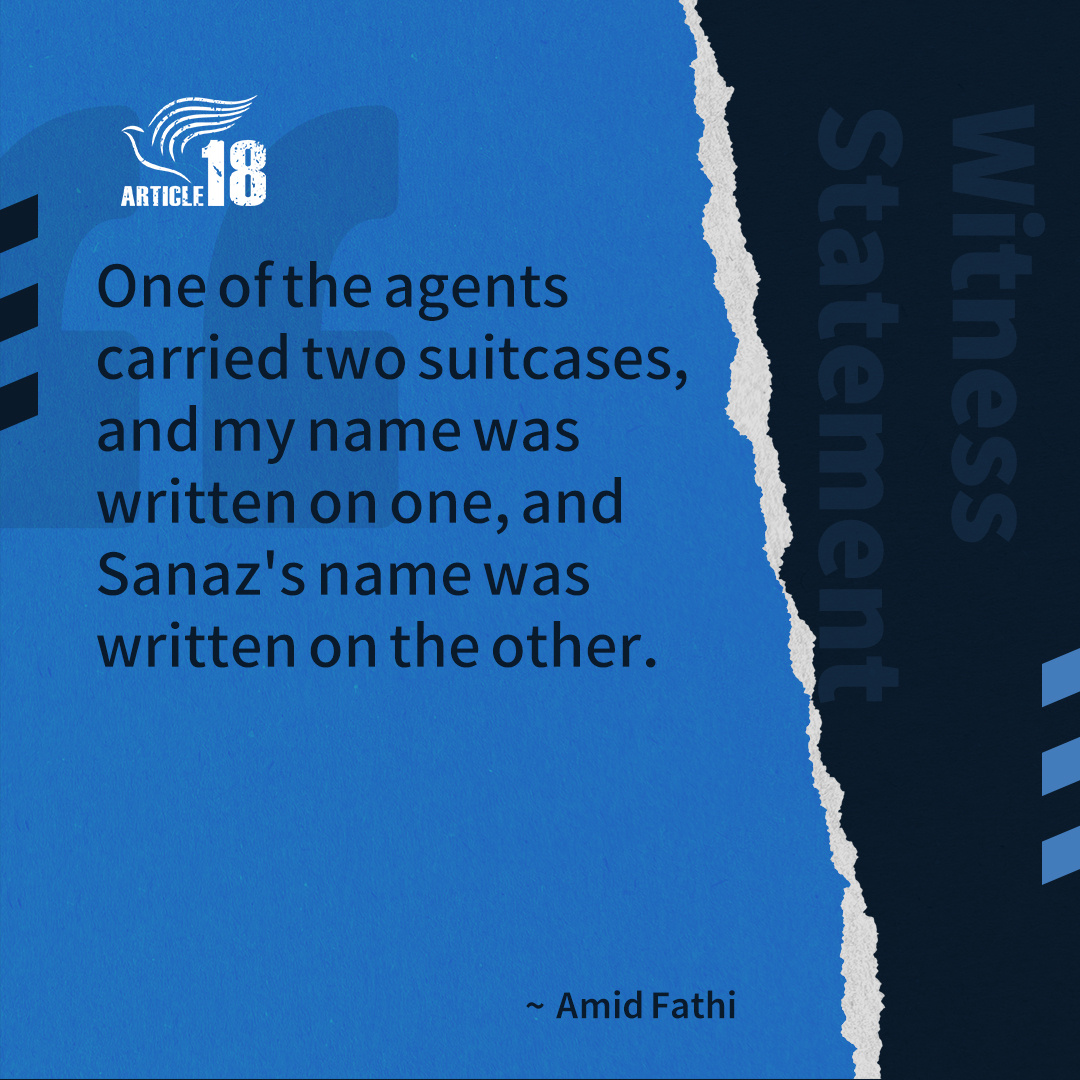
16. I was very shocked. But at the same time, because I’d had the feeling we would soon be arrested, I said to one of the agents: “It’s time.” And the agent said: “Yes, it’s time!” One of the agents had a gun, and he showed it to me. I didn’t understand why at that moment, but later I realised that he wanted to scare me. Another of them carried two suitcases, and my name was written on one, and Sanaz’s name was written on the other.
17. When the agents entered our home, I asked them to wait for me to inform my wife and tell her to get dressed. But the two female agents entered the room with me. “Wake up, Sanaz!” I said. “They are from the Ministry of Intelligence.”
Sanaz
18. My name is Sanaz Karami. I was born in October 1985 in Hamedan. I have a high-school diploma and at the time of our arrest I was an accounting student.
19. As we had gone to bed late, when my husband woke me I could barely open my eyes. I saw two dark shapes standing next to my husband, and as I opened and closed my eyes, I saw that they were two women in black chadors, and they said: “Miss, put on your hijab! Put on your hijab!” I was shocked, and put on a cardigan and head covering.
20. One of the female agents said: “Go stand next to your husband; we have to search your room!” They searched the whole room, and even ripped the pillows and took out all the feathers. “Why did you empty the pillows?” I asked. The agent said: “The pillows were heavy, so we had to search them.” They also emptied our shampoo bottles, and even rummaged through the frozen peas, beans and vegetables. Their intention wasn’t only to search the house, but to torture us mentally and emotionally.
Amid
21. Our guests were sleeping in my son’s room. I knocked on the door and said: “Brother Reza, are you awake? Wake up! They’re here from the Ministry of Intelligence! I apologise; please go home.” I was praying in my heart that the agents would let them go home. One of the agents went out, and called someone; then he returned and said: “Your guests can go home.” I was very happy about this, and when I was saying goodbye to them, I said softly into Reza’s ear: “Inform the others about this incident.”
22. Later, we found out that the guests had told the agents: “We will get a taxi and make our way home ourselves.” But one of the agents had said: “No! no! Not at all! We have caused you inconvenience; we’ll take you there ourselves.” Then, when they had reached their home, the agents had got out of the car and said: “We came to check your home.” And then they showed them their warrant, searched their home, and arrested them.
23. Two months before the arrest, we had been invited to Turkey to participate in a Christian conference. To show that he knew a lot about us, the agent with the camera said: “Did you have a good time in Turkey?” I said: “Yes, I had a good time.”
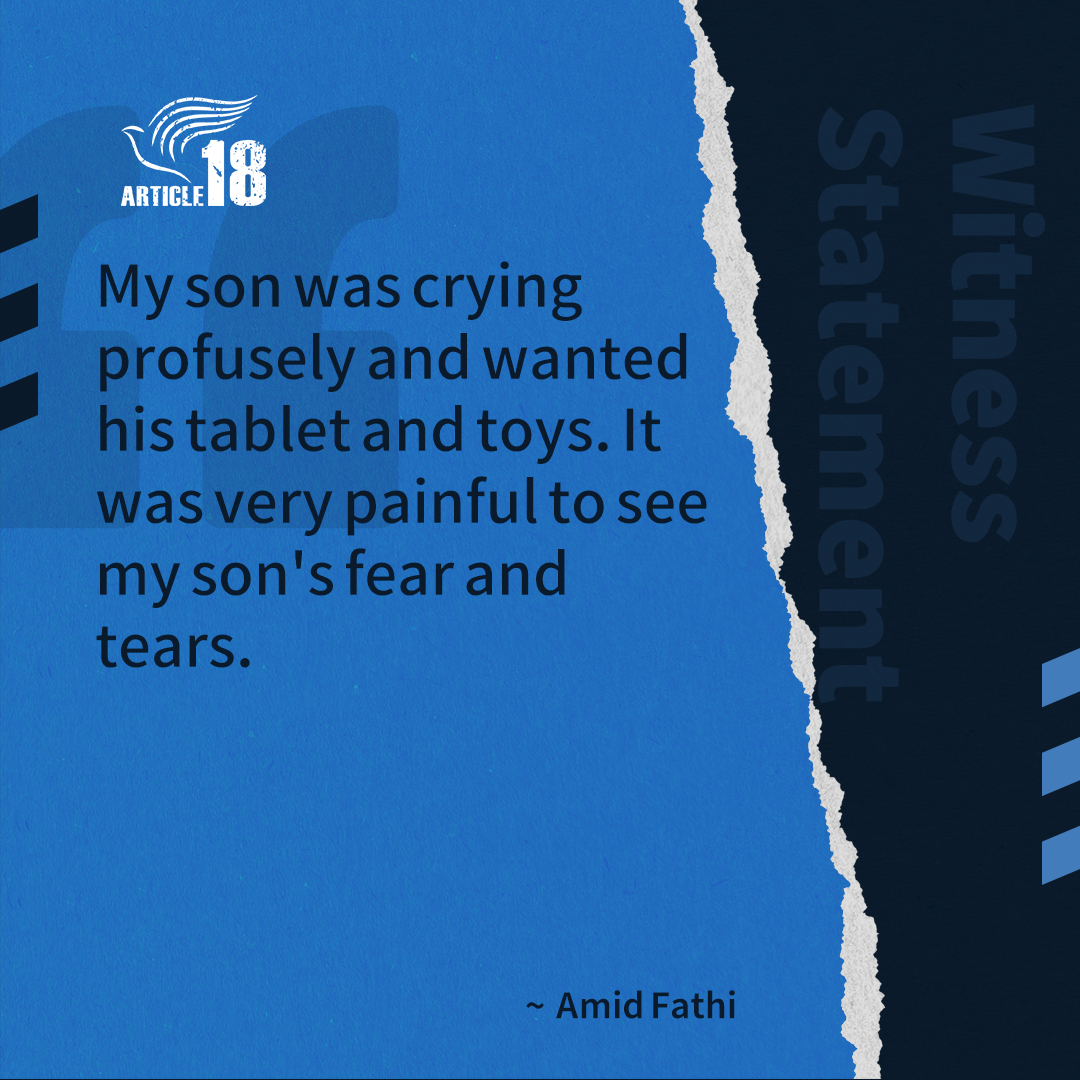 24. The officers mercilessly searched everything in our home, which put psychological pressure on us. They even threw all our kitchen utensils on the floor, and sifted through the beans we had, and the freezer and refrigerator. They seized our Bible, Christian books, and non-Christian books such as novels, as well as my wife’s cross necklace, which was made out of gold, an artwork depicting a cross, our Christmas trees, and my son’s tablet.
24. The officers mercilessly searched everything in our home, which put psychological pressure on us. They even threw all our kitchen utensils on the floor, and sifted through the beans we had, and the freezer and refrigerator. They seized our Bible, Christian books, and non-Christian books such as novels, as well as my wife’s cross necklace, which was made out of gold, an artwork depicting a cross, our Christmas trees, and my son’s tablet.
25. My son was crying profusely and wanted his tablet and toys. It was very painful to see my son’s fear and tears.
Sanaz
26. I asked them to return my son’s tablet. I had installed an application from a Christian ministry on it, but I told them: “There is nothing else related to Christianity on this tablet, except this application.” But they didn’t agree.
27. “Why are you taking that?” I asked when an agent took away one of my son’s toys: a Santa in a snow globe. He said: “It’s a symbol of Christianity, and should be confiscated!” I was upset because of their disrespectful behaviour and strange and cruel way of searching, and I criticised them for it and had an argument with one of them. My husband Amid said: “Let it go! Now isn’t the time! Let them do whatever they like, as they won’t pay attention to anything we say anyway, and we can’t do anything about it.”
28. We had three Christmas trees, and the agent took them out of the cupboard and said: “They haven’t got just one or two, but three trees! Now we’ll take you and give you a lecture so that from now on you celebrate the birth of Prophet Muhammad!”
Amid
29. My wife Sanaz’s spirit is stronger than mine, and she was sitting in the corner of the living room, holding her head in her hands and praying. I sat next to her and we prayed together. Then, when I raised my head for a moment, I saw that the agent with the camera was also filming us praying.
30. They searched our home from around 6.30 in the morning until noon. I had bought many Bibles and Christian books from Tehran, which I had packed away and put in a corner of the yard, and covered with a cloth. The agents didn’t search the yard, so they didn’t find them.
31. Sanaz was upset when she saw how cruelly and strangely the agents searched our home, and criticised their behaviour. But I told her: “Please don’t say anything! We can’t do anything about it!”
32. When they wanted to take us away, I noticed another agent standing outside, who hadn’t entered our house at all. This officer called someone, and said: “Haji, they have too many things! They won’t fit in the car! Send another van.”
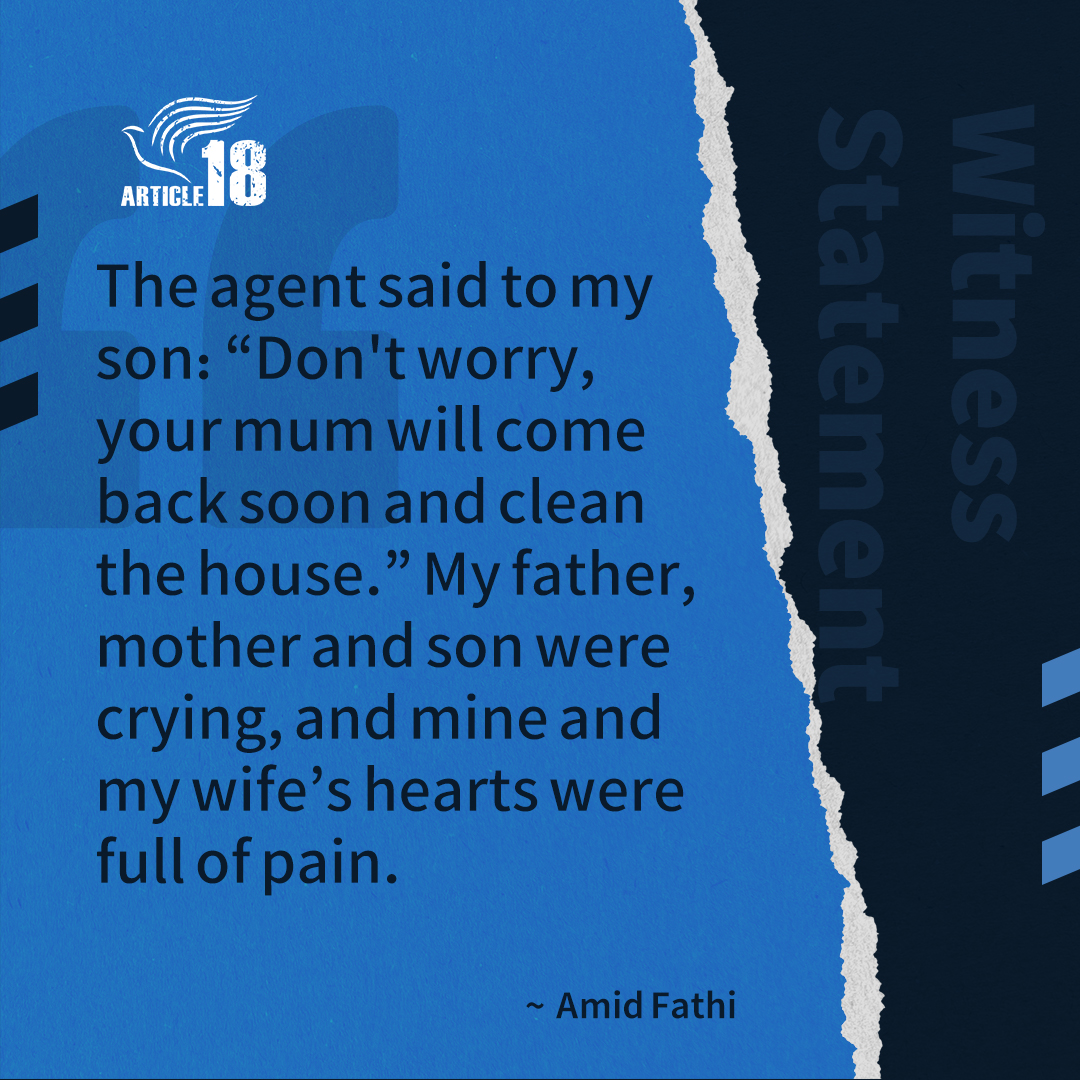
33. Our house had two floors. We lived on the first floor, and my parents lived on the second. My parents are old. My father was about 80 years old at that time. Some time before our arrest, my mother was diagnosed with cancer. She had undergone surgery, and was undergoing chemotherapy, so she wasn’t in a good physical or mental condition. On the day of our arrest, my parents cried a lot, and asked the agents very sadly: “Sir, where are you taking them? What will happen to them?” The officers didn’t answer their questions, though one of them eventually lied: “In the afternoon or tomorrow, they’ll return home.” Then he said to my son: “Don’t worry, your mum will come back soon and clean the house.” My father, mother and son were crying, and mine and my wife’s hearts were full of pain.
34. I asked one of the agents for permission to say goodbye to my mother and father, and after we had done so they handcuffed my wife and me, and put us into a van, and put the suitcases, full of our things, into a car. Sanaz and I were in shock, and as soon as we started driving, an agent told us: “You aren’t allowed to talk to each other!” After we had passed about one or two streets, they put blindfolds over our eyes.
Sanaz
35. On the day of our arrest, I was very sad. My son Danial was small – only about four and a half years old. He was afraid of the behaviour of the agents, and was crying, and now he was going to be left without us, and had to stay with his grandparents. I asked the agent to let me hold my son for a minute before leaving, but he wouldn’t allow it!
Amid
36. We drove for about 20 minutes. Then we had to get out of the car, and they took off our blindfolds. They had taken us to the intelligence centre on Honarestan Street. We knew the place, because it is very well known in Hamedan and isn’t hidden; it is clearly visible to passersby. When we got out, one of them said: “Separate them!” and they undid our handcuffs. I had 50 thousand tomans [approx. $50] in my pocket, and I gave it to Sanaz. Then Sanaz and I were separated. They took me in one car, and Sanaz in another.
Detention
37. This time, the car drove for between half an hour and 45 minutes, but it seemed to me that they were just driving around aimlessly, so that I wouldn’t be able to guess where we were. Finally, I heard the sound of a big gate opening, and the car went through and stopped on the other side.
38. An agent told me: “Get out.” Then he took my hand and guided me. As I was blindfolded, I went to the right or to the left as the agent told me. Then we entered a room, and he undid my handcuffs and asked me to remove my blindfold, take off my clothes, and put on my prison shirt and trousers. So I took off my clothes and put them in a bag, then put on the new clothes.
39. The agent blindfolded me again, and took me into another room. “Get completely naked,” he said. I asked: “Why?” He said: “The doctor wants to examine you to see if you have a problem or not.” So I got naked, and heard someone say: “Turn around; let me see if you have a problem.” I turned around, and told him about a medical condition that I had. Then the doctor said: “You can put on your clothes.”
40. The agent took me into a small cell. There was a short wall at one end of the cell, with a hole behind it for going to the toilet, but even if you squatted on the other side of the wall your head was still clearly visible. Next to the toilet hole, there was a tap attached to the wall, and a plastic jug [for cleaning yourself]. There was no sink, but there was a basic shower head. So you had to drink water and wash your hands from either the tap or the shower. Those were the only options.
41. Although it was winter, they had increased the temperature of the cell to probably around 45 degrees celsius. I was breathing hard, and felt suffocated. But even more irritating than this were the very bright light from the very strong projectors hanging from the ceiling – which was on 24 hours a day – and the extremely loud sound of the ventilator, which wasn’t visible. At least I could use the shower or tap to get water to combat the heat, but there was nothing I could do against the terrible light and loud sound.
42. With the excruciating conditions in the cell – from intense heat to strong light and constant terrible noise – I couldn’t sleep. I became confused and forgetful. After two or three days, I had forgotten so many things. I had taught the Bible for a few years by then, but during those days I could only remember one Christian worship song, and I sang it.
43. My cell was like hell. I thought to myself: “I wish they would beat me and break my bones, but not torture my soul!” I wished to be taken for interrogation and for even an hour to be able to breathe properly, and to be in a place with normal light and no noise.
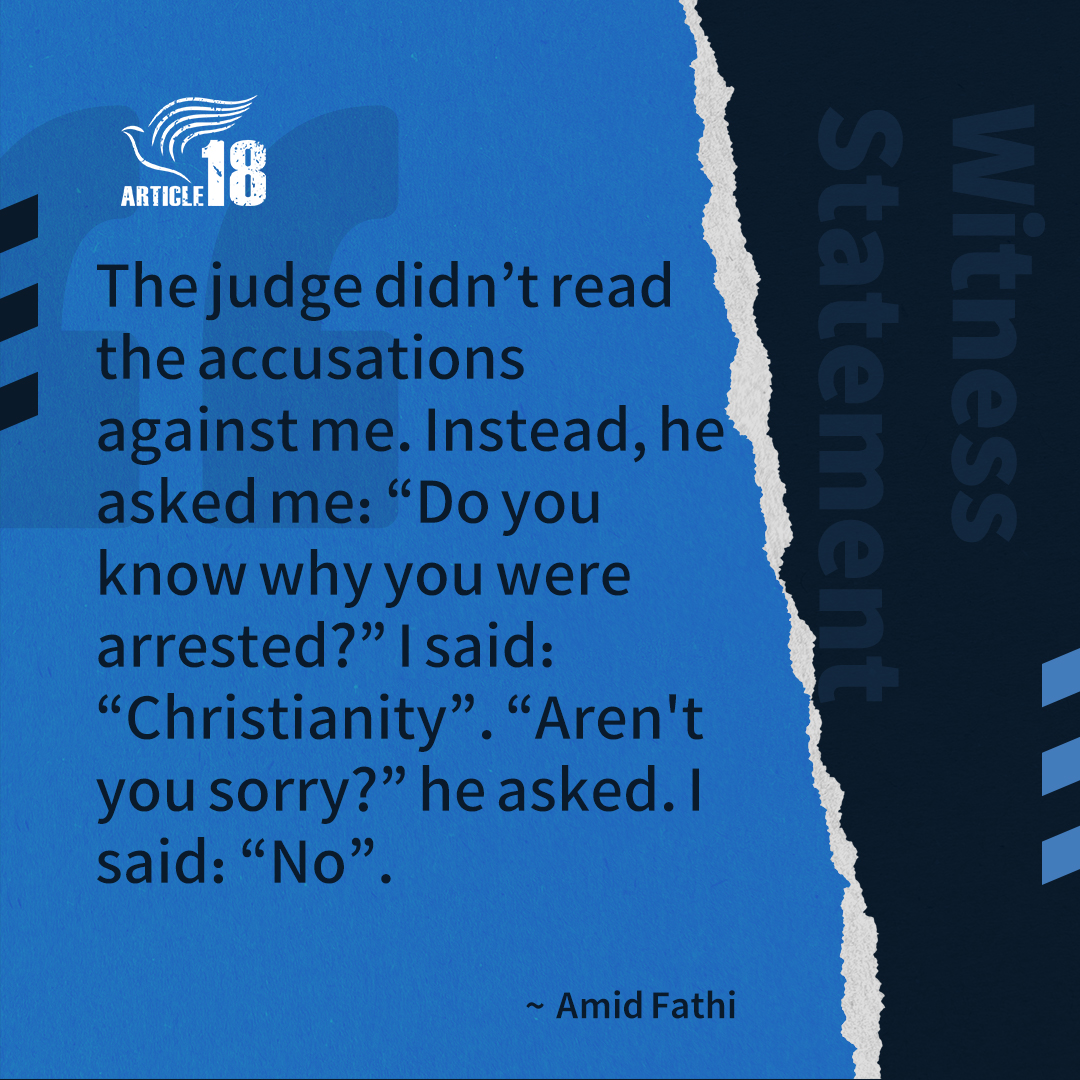
44. At 8pm on the first day of my arrest, I was taken to the duty judge, Yousef Almasi, and he issued a warrant for my detention. He didn’t read the accusations against me. Instead, he asked me: “Do you know why you were arrested?” I said: “Christianity.” “Aren’t you sorry?” he asked. I said: “No.” After issuing the warrant, I was taken to a room for taking mugshots and fingerprints. I asked the employee there: “What is written in my file?” He said: “He has issued a warrant for you, stating that you are to be kept under their supervision.”
Sanaz
45. At the moment when they had separated us, Amid had given me the money and said: “We don’t know what will happen, so you should keep hold of this.” Then he gave me the money and we parted ways. They put the handcuffs and blindfold on me again, and put me in the car. Then they drove me around a little, and then took me to an unknown place, but even when they took me out of the car, they didn’t remove my blindfold. A man came and took hold of the chain between my two handcuffs, and pulled it. I was afraid I would fall because I couldn’t see, so I pulled back against him, but he told me to walk. I said: “I can’t see anything, so how can I walk?” He said: “Shut up! I am telling you to come!” Fortunately I could just see my feet, so when he pulled me I didn’t fall. I knew that if I did fall, those people wouldn’t help me; they would kick me. Because of how cruelly they behaved, I remember those moments well.
46. When I entered, my bag and other personal belongings were taken from me. The female officer said: “Take anything off that is of value.” I started to remove my cross necklace, and she pulled it from my neck and said: “Is this gold?” I said: “Yes, it’s gold.” And she said mockingly: “Yeah, sure it is!” I said: “It is gold; why do you think it isn’t?” She gave it to the officer who was next to her, and told her: “Write down that it’s gold, so that these beggar Christians won’t complain we haven’t done our job properly! Write it down for her.” She also added the money to my file, along with my gold cross necklace and chain. In the end, they took away everything I had. I went inside with only the coat, headcovering and trousers that I was wearing. A little further on, they gave me some other clothes to wear. They were just ordinary grey trousers and a grey shirt, and after they took me to the cell, they gave me a black bin bag and told me to take off all my clothes and put them in that bag. I wore glasses because my eyes are weak, and the officer even told me: “Give me your glasses. You must even put your underwear in this bag, leave it by the door, and wear these other clothes until I come to take your belongings.”
47. It was 1am by the time they took me to Almasi, the duty judge. “Do you know why they arrested you?” he asked. “Yes, I know,” I said. He said: “Do you still stand by what you said and consider yourself a Christian?” I said: “Yes, I’m a Christian.” He asked again: “So you don’t regret it? And you don’t want to express your regret?” I replied: “No, I don’t regret it, so I don’t want to express regret.” The judge lowered his head and wrote something on the paper. Then he turned to me and said: “It’s like you still don’t understand where you are! Soon you’ll understand where you are, and you won’t answer like this again!” Then he wrote an order, and then they took my fingerprints and mugshot, and after doing this I was taken to my cell.
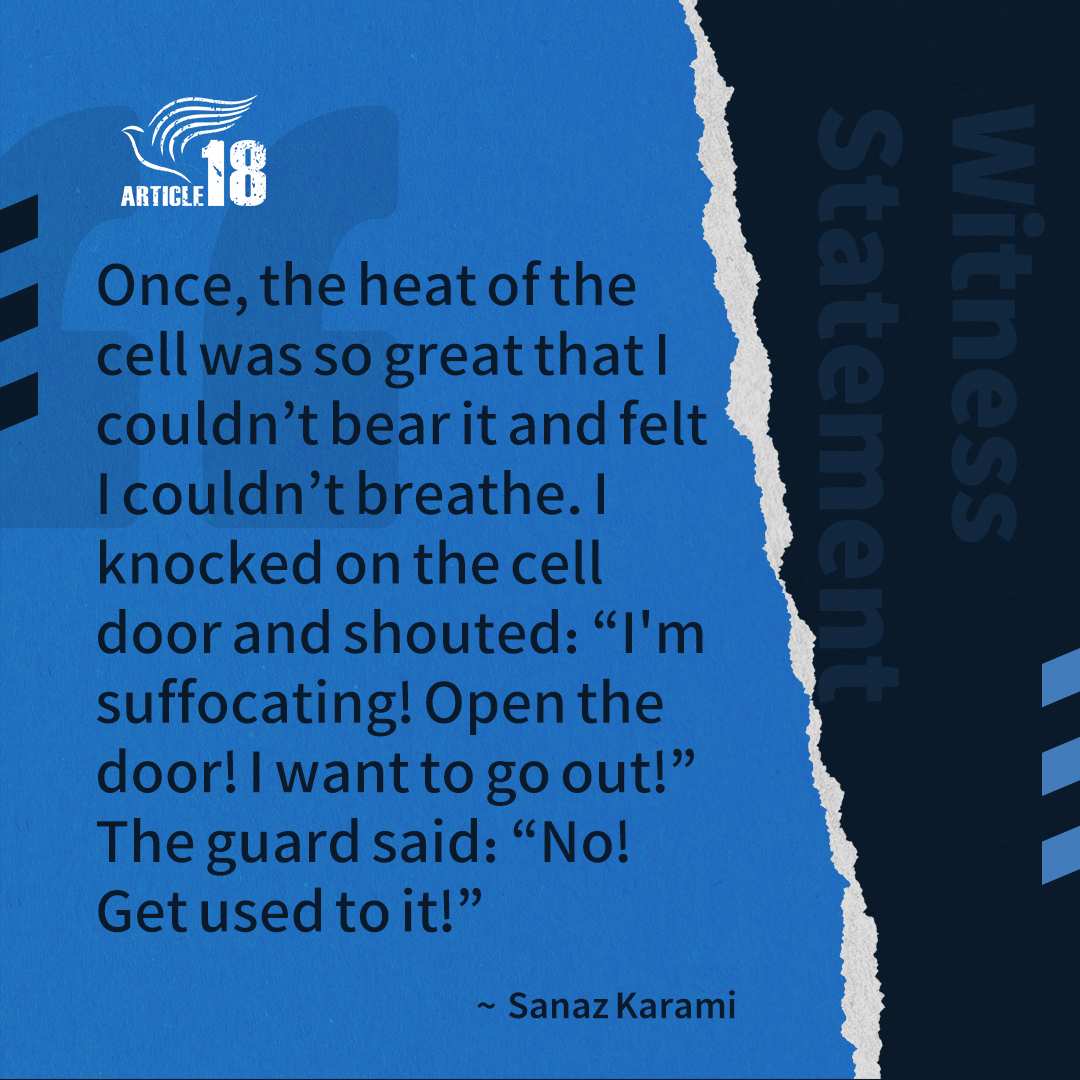
48. In the cell, a lamp was always on. There was a constant horrible noise, and it was extremely hot. There were no windows. Once, the heat of the cell was so great that I couldn’t bear it and felt I couldn’t breathe. Feeling like I was suffocating, I knocked on the cell door and shouted: “I’m suffocating! Open the door! I want to go out!” The guard said: “No! Get used to it!” I was very upset and said: “If you don’t open the door, I’ll knock on the cell door so hard that you’ll have to open it!” After a few minutes of knocking, she opened the door and took me to the yard. I was there for about a quarter of an hour, and the fresh air helped my breathing return to normal.
49. During my detention, whenever the officer wanted to enter my cell and open the door, first she would knock on the door and tell me to turn around and put on the blindfold. So I would put on the blindfold and turn around. Then she would open the door and give me the bag with my clothes in, and tell me to put them and the blindfold on, and then she would take me back to the interrogation room, where no-one else was, and no-one would come. Then, a few minutes later, she would take me back to the cell, and again tell me to change back into my prison clothes. She repeated this process several times a day. The reason they kept doing this was mostly psychological, because I couldn’t see anything, as my glasses prescription is so high. They took my glasses because they wanted to upset me, and they repeated this whole process many times. Sometimes they took me to the room for interrogation and left me there for hours, and no-one would come.
Interrogations
50. After my initial interrogation, they left me in my cell for two days. That means they didn’t take me for interrogation from 28 December until 30 December. But on Wednesday 30 December 2015, at 5 in the morning, they gave me a piece of bread and a piece of cheese, and, after I had eaten, they took me for interrogation. I had different interrogators. On one day, different people would come at different times. For example, once a “psychologist” came, and another time a “student” came for their research. But I had one main interrogator, and everyone seemed to have to answer to him.
51. Once, one of the interrogators asked me: “Do you have anything to say?” I said: “I want to see my usual interrogator.” Then my interrogator came in, angrily, and started swearing: “Shut up, you such and such! When you were doing these dirty things, you didn’t think of what you are, who you are, where you are! Now you have to answer for it!” Then they took me to the cell again.
52. Another time, the interrogator asked me a question and I didn’t answer him. I said: “I want to make a call.” The interrogator said: “It’s like you forgot where you are!” “I just want to call my family, my child,” I said. The interrogator said: “When you were doing these things, you didn’t think of your child. Now you are thinking of him, and you want to call him!” I remained silent.
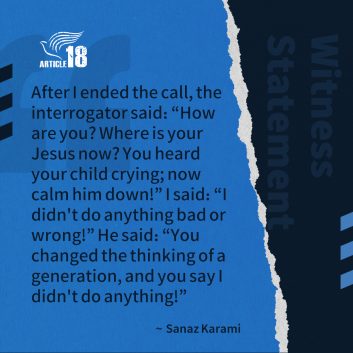
53. The interrogator asked the question again, and I said: “I’m not writing anything.” He said: “Well, at least write on this paper that you don’t want to answer.” He put some questions in front of me, but I didn’t answer any of them. The interrogator said: “You still don’t know! You don’t understand! Once you’ve stayed here for a few days, you’ll understand what place this is!” Then they returned me to my cell again.
54. I was very worried, missed my son, and cried non-stop, and the guard who was there kept knocking on the door, telling me to be quiet. Once, she opened the door and said: “Why are you crying so much? I’ve got a headache [from your crying]. Haven’t your tears dried out?” I said: “I want to talk to my son on the phone, but they won’t allow me.” The guard said: “Well, write down whatever they tell you so that they’ll allow you to call.” I said: “They say I should betray the others, but I’m not a betrayer. I won’t write anything!”
55. They took me again for questioning, put the questions in front of me, and told me to start writing. But I just wrote “I won’t answer” after all the questions. “Why don’t you answer?” said the interrogator. “I have nothing to say,” I said. “I just want to talk to my son.” The interrogator said: “We brought another lady here from your church. She has a small child like you. I told her: ‘Write the answers and then go see your child.’ She said: ‘I entrusted my child to Jesus Christ.’ What did you teach these people? What kind of response is that? Who else will take care of your children? The family of one of the people we arrested said they wouldn’t look after that person’s child. They left the child in the middle of the hall. That child had a seizure and is now in the hospital. Where is Christ? Tell Jesus to take care of that child!”
56. The interrogator intended to scare me with these false stories and weaken my spirit. I was restless, and crying for my child. The interrogator said: “Don’t cry! Write whatever we say and then you can go!” I said: “I have nothing to say.”
57. For my first two days in detention, they constantly said: “Don’t you want to talk to your child? Don’t you want to see how your child is doing? What kind of mother are you that you don’t think of your child at all? Does this mean that you don’t like to talk to your child?” I said that there is no mother who doesn’t like to talk to her child. He said: “Then why don’t you want to talk to him?” I said: “I would like to talk to him, but you won’t allow me to.” He went out, and when he came back in he said: “You can talk to your child for two minutes.”
 58. When I called, my husband’s family picked up the phone and cried when they heard my voice and said: “Where are you? Since the day you left, your child has only been crying and won’t stop!” I could hear Danial crying. As a mother, there was nothing I could do to calm my child and it was very painful. I talked to my son for about two to three minutes. Hearing my son crying made me feel worse and I said to myself that I wish I hadn’t called.
58. When I called, my husband’s family picked up the phone and cried when they heard my voice and said: “Where are you? Since the day you left, your child has only been crying and won’t stop!” I could hear Danial crying. As a mother, there was nothing I could do to calm my child and it was very painful. I talked to my son for about two to three minutes. Hearing my son crying made me feel worse and I said to myself that I wish I hadn’t called.
59. After I ended the call, the interrogator said: “How are you? Where is your Jesus now? You heard your child crying; now calm him down!” I said: “I didn’t do anything bad or wrong!” He said: “You changed the thinking of a generation, and you say I didn’t do anything!” “I didn’t do anything wrong!” I said again. “I just want to get out of here. I want to go to my son.” The interrogator said: “When you were gathering people and spreading Zionist evangelical Christianity, you forgot that you were born a Muslim and became a Christian, and that you made others convert to Christianity too!” The interrogator threatened me: “The complainants in your case want to set your house on fire. We have put a guard outside your house, and at least for now we have not allowed them to do as they want.”
60. He put a number of sheets of paper in front of me and said: “I’ll say the names, and you say their surnames.” I said: “Believe me, I don’t know the surnames of any of them!” He said: “Well, that’s no problem. You tell me the names, and I’ll tell you their surnames and you can write them down. We know everyone and everything about you!” I said: “Then why did you bring me here, if you already know everything?” I didn’t give them any more information than they already had.
61. The interrogator wanted to make us suspicious about each other and cause divisions in our relationships. The interrogator took me, blindfolded and in handcuffs, to stand outside the door of the interrogation room so that I could hear the confessions of others and be provoked to stop resisting and also confess.
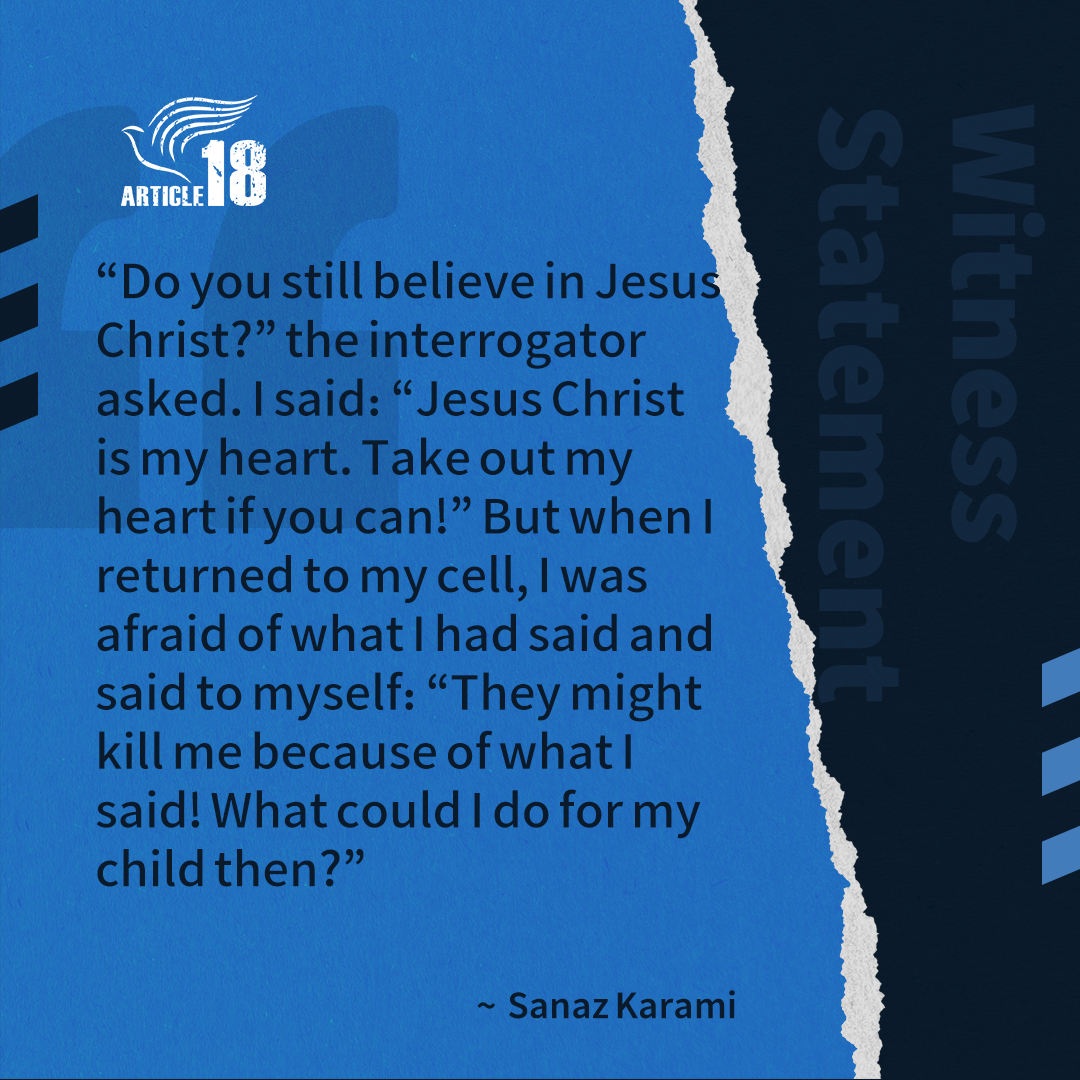
62. Once the interrogator said: “Why don’t you eat? Are you on hunger strike? I said: “What are you talking about? I just can’t eat! You expect me to sit and eat a plate of rice and stew in this situation!” The interrogator said: “Then eat one spoonful so we can be sure you aren’t on hunger strike.” So as usual I said a prayer of thanksgiving for the food, and ate a spoonful. He said: “You are praying for the food? We didn’t put anything in it!” I said: “I don’t care if you have put anything in it or not; I always pray for my food.” “Do you still believe in Jesus Christ?” the interrogator asked. I said: “Jesus Christ is my heart. Take out my heart if you can!” But when I returned to my cell, I was afraid of what I had said and said to myself: “They might kill me because of what I said! What could I do for my child then?”
63. I was interrogated every day, apart from two, and they all followed a similar pattern. They would give me a piece of bread and cheese at around 5 in the morning, and then an hour later they would take me for interrogation, and sometimes the interrogation would continue until midnight. Sometimes the interrogator would interrogate me for several hours, then leave me alone in the room and later come back again. Sometimes the interrogator would interrogate me continuously for hours, or one interrogator would leave and then another would come and ask the same questions.
64. One day the interrogator shouted and insulted me, and I took off my blindfold and said: “I won’t wear a blindfold anymore, and I won’t let you talk to me like that!” “Shut up and sit down!” the interrogator said. Then he cursed me very badly. I said: “I won’t sit down! I won’t even wear a blindfold! Whoever wants to can come and blindfold me!” But from that day on, during all the interrogations, I wouldn’t wear one. Then, one day, a new interrogator came and said: “You made your interrogator nervous, so now I’ll be your interrogator!”
65. In the interrogation room, God strengthened me to bravely resist and defend my rights. But when I returned to my cell, I would cry for my son.
Amid
66. The number and length of the interrogations were too much for me. I was blindfolded during every interrogation, and had to sit facing the wall. I had at least four interrogators. One person was in charge of the entire interrogation team and he introduced himself as “Mr Hosseini”. Sometimes they would take me to the interrogation room, and I would be left alone in the room for about three or four hours, and then someone would come and say: “Haji isn’t here; go back to your cell and come back later.” Sometimes the interrogator would ask just one or two questions, then leave the room and return two or three hours later and continue. All this waiting made me restless. Sometimes the interrogator would interrogate me for about four hours, and when I didn’t give him the answer he wanted, he would tell the guard: “Take him to his cell! It’s like he hasn’t got it yet and doesn’t know where he is! Otherwise he wouldn’t have answered like that!”
67. But of course the atmosphere in the cell was also very bad and so at the same time I also in some way preferred to be in the interrogation room, which at least provided a break from my cell, and I was able to talk to someone and have a few hours away from the intense heat, strong light, and horrible noise of my cell. Once, they didn’t take me for interrogation for about two days, and in this way they wanted to put me under psychological pressure.
68. During the interrogations, they always faced me against the wall, and their table was behind me. The first time they allowed me to remove my blindfold was to talk to a student about Islam, who tried to convince me to return but couldn’t.
69. They used the technique of good interrogator, bad interrogator. The bad interrogator would shout threats and insults, and one of them threatened to rape a Christian lady who was a member of our church. But I didn’t give in to their threats. Once, an interrogator said: “You have many complainants! The families you talked to about Christianity want to go and burn down yours and your parents’ house! Our officer is guarding your house; if you don’t cooperate, we’ll tell our guard not to continue, and the complainants will have the opportunity to harm your family!” This “good” interrogator was trying to convince me to cooperate on the proviso that no harm would come to me and my family.
70. I was active in Alcoholics Anonymous [AA], and in the detention centre, my interrogators told me: “Write for us about the structure of those groups – what it’s like there, what they do, what their programme is, and what steps they take.” Then, one day they took me to a room and turned on the camera and asked me to talk about what I had written, and so I did. Then they put a piece of paper in front of me and told me to write down that I repented and declared that I wanted to return to Islam. But I refused, and they let it go.
71. The interrogations weren’t limited to the interrogation room. Sometimes they even asked me to fill in the interrogation sheets in the cell. They said: “Write about your life; write about where you’ve been, what you’ve done, or about the structure of the 12-step AA groups.” One night, on the occasion of the prophet of Islam’s birthday, they brought a magazine and gave me a 2,000 toman note [$2] and an apple. I wrote on the note with the pen I had for writing on the interrogation papers: “Today is Friday, the 14th day that I am in the solitary confinement of the Ministry of Intelligence, and I am looking to God and the future. God is my salvation. Everything is against me, but I believe that God is with me.” After my release, I took that banknote out of the detention centre with me, and it is a very dear souvenir for me.
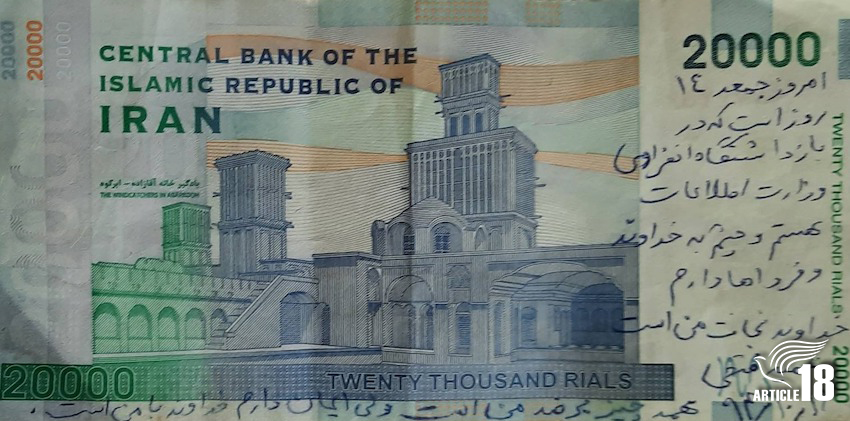
A photograph of Amid’s annotated banknote.
72. It became clear from the information they had that the agents had put a listening device in our house and had been listening to our conversations, and I remembered a day when we had gone hiking with church members and a car had parked in front of our house and some people had tried to enter. Our neighbour, who had noticed it and had written down the car’s licence plate number, called the police, and an hour later they had come to our neighbourhood, but by then the car had gone. When I got back home, I went to the police station, and then the criminal investigation branch, with the licence plate number of the car, but I didn’t really get an answer and they just told me to go and that “we’ll call you”. Really, they just cut me off. And when we were arrested, I became sure that those people had been from the Ministry of Intelligence and had probably come to install the listening device in our home.
73. During my detention, a bad and strange thing happened to me. On the 13th or 14th day of my detention, at night, the guard gave me a stack of paper and two pens, and said: “Haji says that if you filled every sheet and wrote about yourself and your group, it still wouldn’t be enough! Confess and see what we can do for your case!” I said: “Tell your Haji I have nothing to say. These are my friends! We have known each other for years! I have nothing to tell you.” The guard said: “Is this your final decision?” I said: “Yes. I have nothing more to say.” The next morning I prayed as usual, and felt fine. But then at noon, they brought me rice and minced-meat stew, and after I had eaten half of it I began to feel sick. My heart was pounding, and I felt like it was about to be ripped out. I put my hand on my heart and prayed. Although I had become forgetful before this incident, at that moment I remembered the verses of the Bible and the promises of God, and I asked God for healing and health, and after a while my heart rate returned to normal. The guard never usually came to my cell at that time of the day, but suddenly he opened the door and said: “What happened?” I said: “Nothing special.” Then I realised that there must be a camera in my cell, and that I was always being monitored.
74. At first I thought that what had happened might have been just due to my mental and physical condition, but in the end I concluded that something must have been put in my food because I had also become extraordinarily sensitive and emotional. Just by hearing the word “you”, I would start crying. This scared me, and I concluded that they wanted to kill me, or perhaps had put something in my food to make me have a heart attack and die, and make my death look normal.
75. The interrogator had asked me several times: “Do you want to talk to your son on the phone?” And I had said: “No.” The interrogator had said: “Your child is sick; don’t you want to talk to him?” I had answered: “It doesn’t matter; God gave him to us; God will take care of him.” But that day, when the interrogator said, “Do you want to talk to your son?”, I said: “Yes.”
76. Before the conversation, and even during my conversation with Danial, I was crying. And I wasn’t that type of person at all, and I realised that they must have put something in my food that had a very bad effect on my heart rate and emotions. In those days, Sanaz was temporarily released on bail. So, after talking with Danial, Sanaz took the phone and I also talked with her.
Temporary release
Sanaz
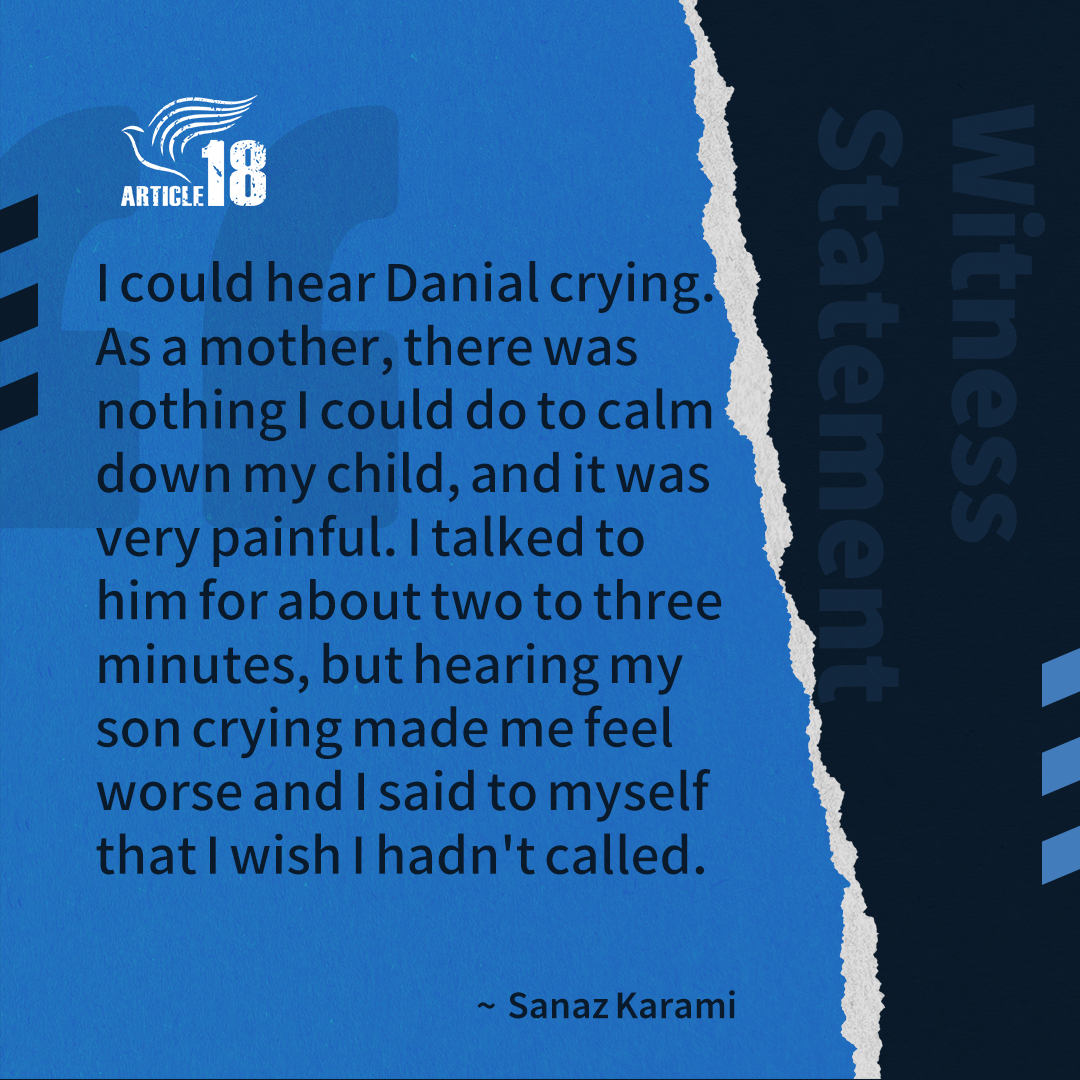
77. The day before I was released, they put me in front of a camera and gave me some text to read out. But I refused to comply. And every time I said something other than what they wanted, they would stop filming and say: “No! Don’t say that! Say it again, but this time as it is written!” But each time I answered in the way that I wanted. So the filming had to be stopped and repeated several times, and when they saw that I still wouldn’t do as they wanted, they finally gave me another sheet of text, denying my faith, and told me to read it out. They said: “You have to say the shahada [Islamic statement of faith] and return to Islam, so that your case is complete.” But I refused, threw the paper to one side, and said: “I won’t do this under any circumstances! I won’t say the shahada and I won’t return to Islam!” The main interrogator, who saw that insisting wasn’t going to work, said: “Let her go; there’s no need to film her saying the shahada.” So they turned off the camera and took me back to solitary confinement.
78. On the last day I was interrogated, the interrogator said: “Make a call so that your bail can be arranged, and then you can go home after we have taken you to the court.” Then they took me to court, and a bail of 30 million tomans [approx. $30,000] was issued for me. But they wouldn’t accept my father’s property deed, and lied that the document had a debt attached to it. My father told them: “There is nothing wrong with my document!” They said: “Sir, the registry office told us that your document has a debt attached to it, so if you like you can go to the registry office and bring back proof from there that there is no debt.” When I had arrived at the court, the officer had told me: “Your father’s house document has a debt attached to it, so they’ll send you to the central prison.” There wasn’t really any debt or problem with the document, but I think the interrogator wanted to send me to the central prison to scare me.
79. Then we went to Hamedan Central Prison, which was outside the city. When we entered the area where they processed prisoners and their belongings, they asked me what crime I had committed, and I said: “Christianity.” Then the officer who had accompanied me elbowed me in the side, and whispered to me that I mustn’t speak. The first officer said: “I didn’t hear what you said.” But the officer next to me immediately answered: “No, no, no, she was part of the political protests after the 2009 presidential election. Write that down!” And they didn’t allow me to say anything more; they just took me inside.
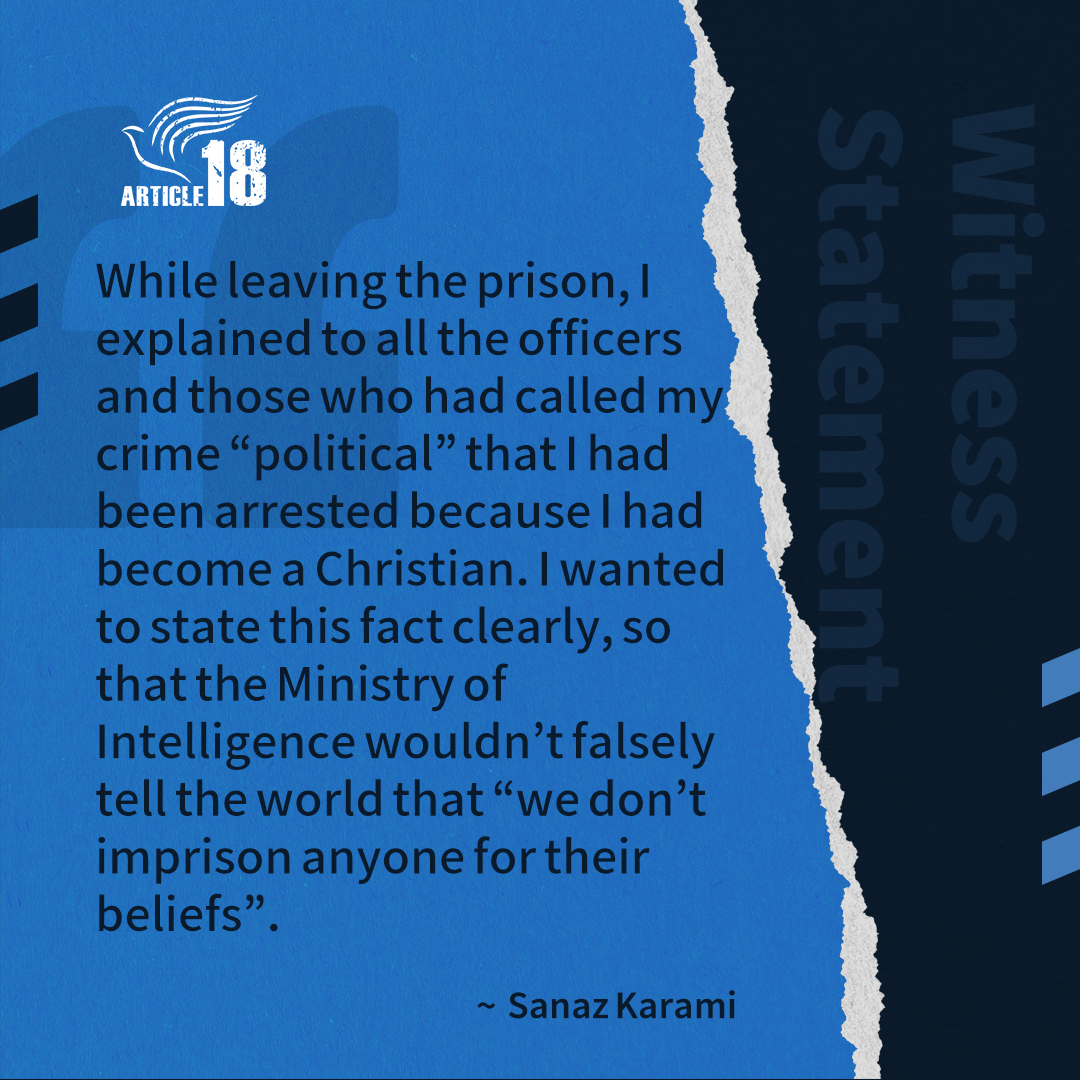
80. But at around 2pm that same day, I was released from the prison, after my father finally managed to submit the deed of his house for my bail. While leaving the prison, I explained to all the officers who had heard it being claimed that my crime was “political” that I had been arrested because I had become a Christian. I wanted to state this fact clearly, so that the Ministry of Intelligence couldn’t falsely tell the world that “we don’t imprison anyone for their beliefs”.
81. I had been detained for seven days when, on 2 January 2016, I was released on bail.
82. After being released, I went to the house of the guests who had been in our house on the day of our arrest. Another member of our church, who had also been detained, was there and said: “I heard Amid’s voice in the detention centre, and it sounded like he wasn’t doing well.” When I heard this, my worries about Amid increased and I fainted. I was afraid that they might have harmed my husband, or even killed him.
83. The next day, a person from the Ministry of Intelligence called me and said: “Why did you walk around and go from home to home, looking for the other members? You have no right to go anywhere! Stay in your house!” But I didn’t pay attention to his threat.
Blank cheques for freedom
84. After I was released on bail, I visited several families to find out how they were doing. I went to several places to find a lawyer, but most weren’t willing to represent “security” cases. They said: “These cases are full of trouble and failure, and it’s impossible for us to win!” The only lawyer who agreed to take on the case wanted a high salary, but my husband’s uncle said: “Don’t bother! It’s obvious he can’t do anything to help; he just wants to take your money and later say, ‘I tried my best but unfortunately it didn’t work.’”

85. After a few days, the Ministry of Intelligence summoned me by phone. They wanted me to go back to the Ministry of Intelligence centre on Honarestan Street, which is known as “Prison Corner”. Their headquarters was there, and I had to go there every time I was summoned. When I arrived, the interrogator said: “We didn’t release you to run around looking for this and that! You’re only temporarily free and have to wait for your trial! You and your home are under surveillance! We summoned you to tell you that you and your husband did a lot of bad things, but we want to do something for you due to Islamic mercy.” I replied: “You don’t care about us. Why do you say ‘mercy’? What is it that makes you feel compassion for us?” The interrogator said: “We too are Iranians, so we are compatriots, even if we don’t have any relation to each other at all. We know that you were deceived by the Zionists and became victims, and we want to fix this situation for you.”
86. I asked the interrogator what he expected from us and what I should do. He said: “You don’t need to do anything; just sign your name under these two blank 100 million [approx. $100,000] promissory notes, and we’ll give them to your husband to sign as well.” I said: “My husband may not want to sign them!” He said: “We’ll make an appointment for you and your husband to talk together, and make a decision. Tomorrow, I want to present your husband’s case to the court. If you come back here tomorrow at 7am, with the promissory notes, we can do something for him. But know that if you don’t sign them, we’ll keep your husband in custody for as long as we want! We are completely independent, so no-one can object to our decisions! We can use the excuse that his case hasn’t been completed, and keep your husband as long as we want! So come tomorrow and reach an agreement with your husband.” And he emphasised that: “You shouldn’t tell anyone about this.”
87. So the next day I went back again and saw Amid for the first time since the arrest, and we agreed that we had no choice. If we didn’t give them the signed promissory notes, my husband would stay detained, so we agreed to their illegal offer. ”
Amid
88. The day before I was released, the interrogator from the Ministry of Intelligence called my wife and asked for the 100 million promissory notes in exchange for sending my case to the prosecutor’s office. The interrogator stressed that “this issue should be kept between us, and no-one should know about it, except you and your wife”. The interrogator warned: “If you raise this issue with the judge, we’ll deny it and keep your case open, and you’ll remain in custody. We want to be reassured that you won’t continue your Christian activities once you are released. If you start your activities again, we’ll arrest you, and this time we’ll take you to the prison because the promissory notes show you owe a lot of money!
Sanaz
89. The next day, at 7 o’clock in the morning, I signed the two promissory notes and handed them over. Amid also signed them, and the investigator sent his case to the court to determine his bail and arrange for his temporary release. After this, I returned home.
Release
Amid

A photograph of Amid on the day of his release.
90. On 13 January 2016, they took me to the court, before the judge, and he set a bail of 30 million tomans [$30,000] for me. In addition to my bail, which was covered by the property deed of my mother’s house, the Ministry of Intelligence secretly and illegally took into their possession the two 100 million promissory notes signed by me and my wife. Then, finally, after 18 days’ detention in solitary confinement, I was temporarily released and returned home.
91. After our release, the agents were watching us. We didn’t feel safe, even in our home. We couldn’t talk easily, or even have marital relations. Everywhere we went, they deliberately showed themselves to us to convey the message that “we’re watching you”.
92. We were informed through one of the female members of the church, who had been our guest on the day of our arrest, that on that day, between 6.30 and 7am on 27 December, the agents of the Ministry of Intelligence had gone to around 40 homes of the members of our house-church and arrested most of those who had had responsibility for doing any activities within the church. They searched the homes of those who were home – around 70 per cent of the members – and the rest were summoned by phone.
93. Some of the members with small children weren’t even allowed to contact their families to hand over their children to them, and had to leave their children with their neighbours.
94. Most of them were released on bail after a week of detention. But they threatened and scared every one of them, and before their release the agents of the Ministry of Intelligence forced each of them to sit in front of a video camera, and gave them a text to memorise and confess in front of the camera. They were also told that they should say that they are no longer Christians, say the shahada, and declare that they had become Muslim again. Some of the members refused, but some felt they had no choice. They also demanded certain commitments from all the members, the content of which I don’t know.
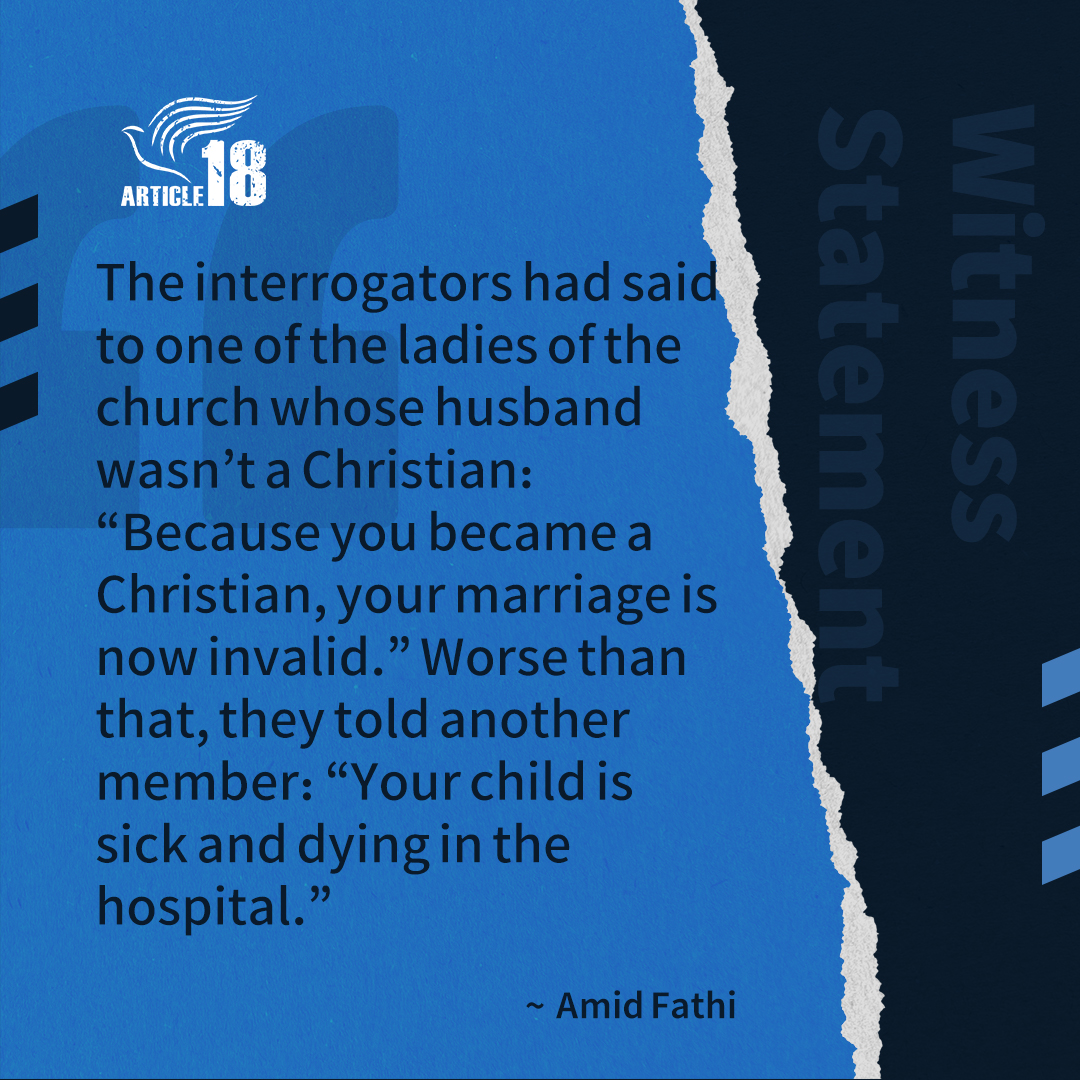
95. The members of the church had resisted very well in the first days of their detention – I could even hear some of them during their interrogations – but after a few days, they became very scared. The interrogators had said to one of the ladies of the church whose husband wasn’t a Christian: “Because you became a Christian, your marriage is now invalid.” They told some of the other members: “The neighbours threw your children out of their houses and said, ‘We won’t keep these children!’” Even worse than that, they told another member: “Your child is sick and dying in the hospital.”
96. However, the Ministry of Intelligence only found out about the groups our house-church had in Hamedan, while the other house-church groups we had in Karaj and other cities weren’t exposed.
97. The Ministry of Intelligence regularly called Sanaz and summoned her following our release. I went with Sanaz on two occasions. On the first occasion, the interrogator asked her: “Why didn’t you come alone?” Then the second time he said there had been no reason for the summons: “We just wanted to ask how you are doing.” They had stolen our peace. Whenever they called us, we were very stressed about what they might want from us now. It was a very chaotic situation. In the first days after our release, we didn’t even dare to pray at home.
Leaving the country
98. After a few weeks, we stopped being so scared and started to pray together again, but we decided to flee Iran before our court hearing. At first, we thought we would be banned from leaving the country, and wanted to smuggle ourselves out. But the smuggler we found didn’t answer our call. So, after praying, we decided to buy plane tickets to Turkey. We said goodbye to our close relatives, and fled from Iran on 8 March 2016, and arrived in Turkey.
Verdict
99. Two months later, the summons for Sanaz and me to attend the court hearing was sent to Sanaz’s father’s house. On 12 May 2016, our trial was held in Branch 1 of the Hamedan Revolutionary Court, presided over by Judge Abbas Ghaderi-Nasab. Forty-two members of our church were accused as part of the same case. After some time, they sent the court verdict to Sanaz’s father’s house. Our charge was “propaganda against the Islamic Republic regime in favour of hostile groups”. The judge had issued a one-year suspended prison sentence for 25 of the members – mine and Sanaz’s sentences weren’t suspended – and some of the others were fined, or had to make certain commitments.

100. Only one of the members appealed. Except for that one person, the rest of the members didn’t appeal, but because of this one person I think the whole case slowed. And all the members had to submit bail – some brought a borrowed document belonging to their family members, and others brought money, though it was really hard for some of them to get documents or cash. In the end, they kept the case open for a whole year under the pretext that “we are dealing with it”. And at the end I don’t know what happened to the person who appealed. Maybe she was acquitted; I don’t know. We weren’t informed.
101. Since we were out of the country, they confiscated the documents submitted for our bail. Sanaz’s father had left the deed of his house as collateral for Sanaz. For me, the deed of my mother’s house had been given as my collateral.
Sanaz
102. The Ministry of Intelligence scared my father and said: “If Amid and Sanaz don’t return, we’ll put your house up for auction!” So my father paid 30 million tomans [$30,000] to release his house deed. But in the end they wanted even more money, so my father had to pay them even more to secure the release of his house deed.
103. My father had heart disease, so at the same time as he was going to the hospital for treatment, he had to go to court to release his house deed. It was a very bad situation, and there was nothing we could do about it, which really upset me.
Amid
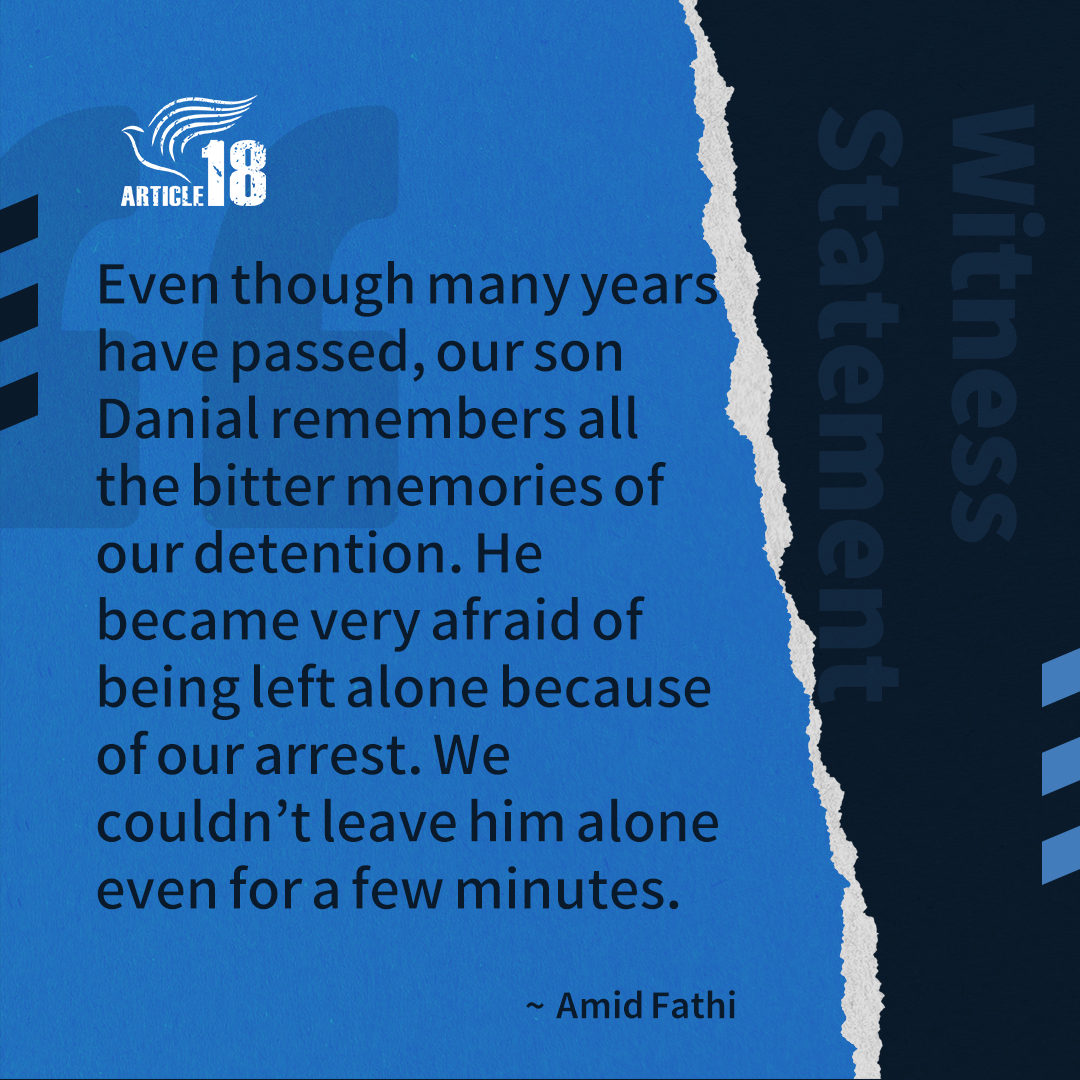 104. When we came to Turkey, our families were banned from leaving the country for 18 months; they took away the passports of my father, mother and sister at the airport, and they weren’t allowed to travel. They treated them very badly. They were summoned several times to the Ministry of Intelligence in Hamedan. They were constantly calling and insulting them. My sister was very scared. Sanaz’s father was also constantly summoned to the Ministry of Intelligence. They said: “We had mercy on Amid and Sanaz and temporarily released them. Tell them to come back and introduce themselves. We are an Islamic Republic; if they don’t come back, we can put them in a sack and bring them back! But if we have to go to get them ourselves, know that their sentence will be death!” My parents were scared by these threats, and our families were very worried about us.
104. When we came to Turkey, our families were banned from leaving the country for 18 months; they took away the passports of my father, mother and sister at the airport, and they weren’t allowed to travel. They treated them very badly. They were summoned several times to the Ministry of Intelligence in Hamedan. They were constantly calling and insulting them. My sister was very scared. Sanaz’s father was also constantly summoned to the Ministry of Intelligence. They said: “We had mercy on Amid and Sanaz and temporarily released them. Tell them to come back and introduce themselves. We are an Islamic Republic; if they don’t come back, we can put them in a sack and bring them back! But if we have to go to get them ourselves, know that their sentence will be death!” My parents were scared by these threats, and our families were very worried about us.
105. Even though many years have passed, our son Danial still remembers all the bitter memories of our detention. He became very afraid of being left alone because of our arrest. We couldn’t leave him alone even for a few minutes. For example, when we went to the grocery store, I would ask him to stay behind but he would cry and say: “I’m afraid that they’ll take you and you won’t come back, or something will happen to you!” When he was younger, even when he was playing in his room he would keep calling me and his mother to make sure we were home… It’s a little better now. In 2019, our second son, Benjamin, was born in Turkey.

A recent photograph of Amid, Sanaz and their two boys, Danial and Benjamin.
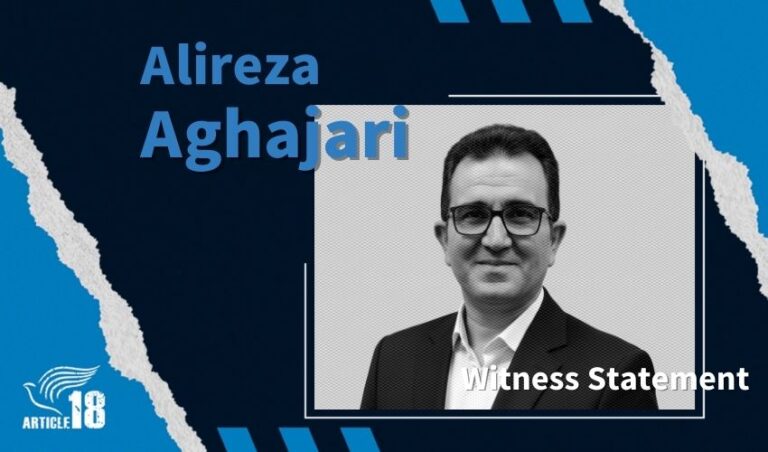
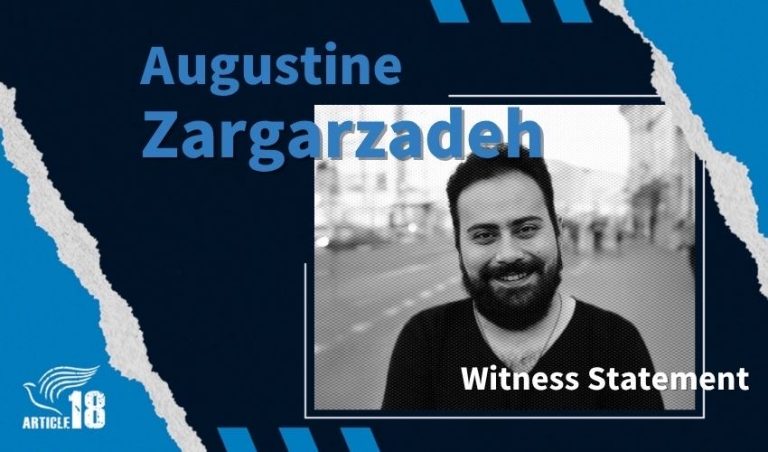
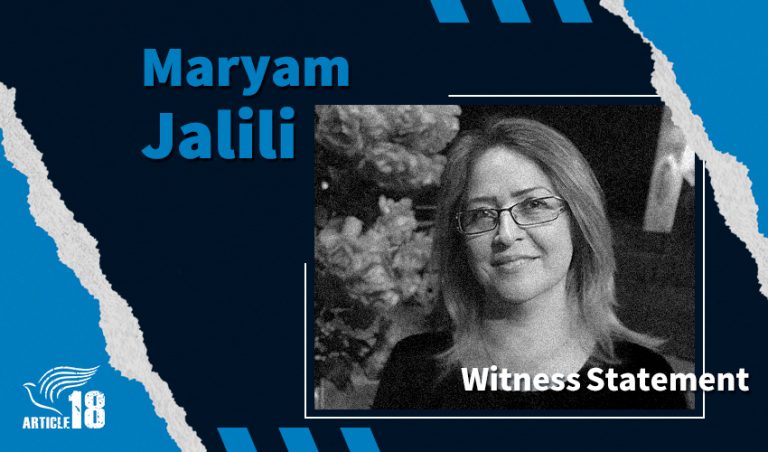
0 Comments
Trackbacks/Pingbacks